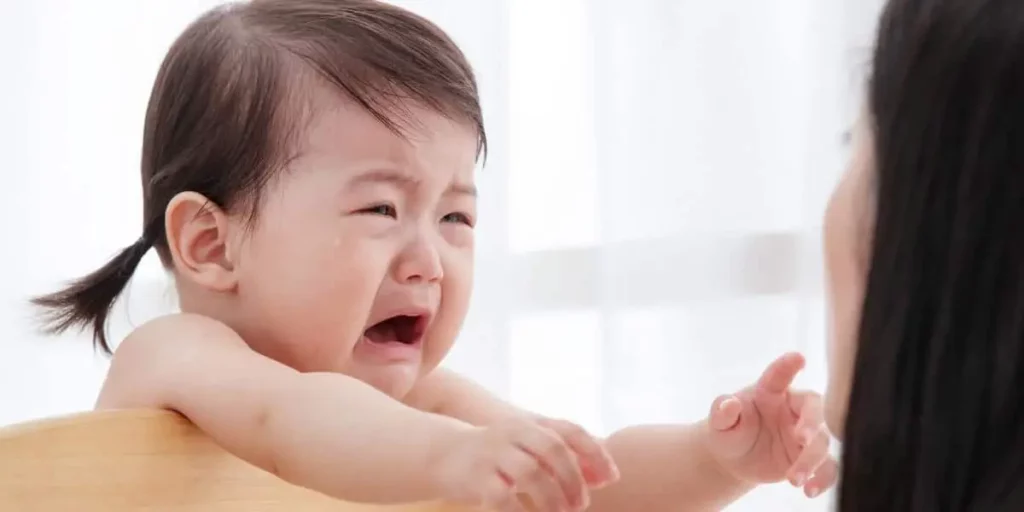
Parents of young infants often become distressed seeing their baby straining and crying to poop but not constipated. The condition, known as infant dyschezia, can be very worrisome. Infant dyschezia is a condition that causes difficulty or pain when passing stools.
This can lead to babies straining and crying in an attempt to get relief. If you think your baby might have dyschezia, it’s important to take them to the doctor for diagnosis and treatment. In this blog post, we will discuss infant dyschezia in more detail.
We will also provide information on how to help your baby cope with this condition.
What Is Dyschezia?
As mentioned above, infant dyschezia is a condition that causes difficulty or pain when passing stools. A healthy bowel movement must always be the goal for infants.
What Causes Dyschezia?
Infant dyschezia can be caused by various factors such as:
Anal Fissures
Anal fissures are small tears in the skin around the anus. They can be caused by constipation or diarrhea. Anal fissures can be very uncomfortable for babies and even older children. This can cause itching in the anus if it is not attended to immediately.
Fecal Impaction
Fecal impaction is a condition in which hard, dry stools become stuck in the rectum. This can cause pain and bleeding when passing stools. Kids with fecal impaction might need medical attention to help them pass their stools properly.
Irritable Bowel Syndrome (IBS)
IBS is a condition that affects the digestive system. It can cause abdominal pain, bloating, and diarrhea. A baby with IBS will need help to pass stool comfortably. It’s best to take your child to the doctor if they have IBS.
Constipation
Constipation pertains to having hard stools that are difficult to pass. This can cause dyschezia. Usually, parents of babies with constipation resort to rectal stimulation, especially if they notice that a baby’s effort to poop is in vain.
When a baby pushes hard to release stool but stool does not pass, the baby becomes stressed and red in the face. Stool softeners can also help. Plus, tummy time, which helps improve abdominal muscles, is also a good option when treating constipation.
Hirschsprung’s Disease
Hirschsprung’s disease can cause dyschezia because it affects the muscles in the large intestine. This can cause constipation and stool impaction. One of the symptoms of this disease is infrequent stools.
Sometimes, soft stools might manifest. However, the baby will usually have an anus tightly closed, which can be very uncomfortable for a baby.
Celiac Disease
Celiac disease can also cause dyschezia. This is because it interferes with the absorption of nutrients in the small intestine. This can lead to diarrhea and constipation.
Parents can give their babies fruit juice or enough fluids to help promote soft stools in infants. Once a baby can start transitioning from breast milk to baby foods, parents can observe uncontrolled stooling reflex and even instances of dyschezia better.
What Are The Symptoms Of Dyschezia?

Dyschezia typically causes pain when passing stools. However, other symptoms may also be present such as:
- blood in the stool
- itchy anus
- swelling anus
- straining to poop
- crying while trying to poop
What Are The Treatment Options For Dyschezia?
The treatment for dyschezia will depend on the underlying cause. If constipation is the cause, then laxatives or stool softeners may be recommended. If Hirschsprung’s disease is the cause, then surgery may be necessary. If the dyschezia is caused by an anal fissure, then topical creams or ointments may be recommended.
The best way to determine the best course of treatment is to speak with your child’s doctor. They will be able to properly diagnose the cause of the dyschezia and recommend the best treatment options.
Take note that you should NEVER give your child any medication unless it has been prescribed by their doctor.
Baby Straining and Crying To Poop But Not Constipated: What Should I Do?
If your baby strains to poop but not constipated and has dyschezia, you can expect the following things:
- Your baby will strain and cry when trying to poop.
- Your baby’s stool may be soft or liquid.
- There may be blood in your baby’s stool.
Even if you have already talked to your baby’s doctor and a treatment plan is in place, it is important to keep an eye on your baby. Make sure to monitor their stool and report any changes to their doctor.
It is also important to encourage your baby to eat a healthy diet and drink plenty of fluids. This will help prevent constipation and make it easier for your baby to have regular bowel movements.
If you are concerned about your baby’s dyschezia, or if they are not responding to treatment, talk to their doctor. They may refer you to a pediatric gastroenterologist for further evaluation.
While your baby is in recovery from dyschezia, you must also be patient. This process can take some time, but eventually, your baby will be able to poop without pain or strain. Until then, keep up with their treatment plan and offer plenty of love and support.
Dyschezia can be a difficult thing to go through, but with the help of a doctor, your baby will get better in no time.
What Happens If Dyschezia Is Left Untreated?

If dyschezia is left untreated, it can lead to more serious problems like constipation, fecal impaction, or even rectal prolapse. These are all very serious conditions that can cause a lot of pain and discomfort for your child. That’s why it’s so essential to get dyschezia treated as soon as possible.
Will Dyschezia Go Away On Its Own?
Dyschezia usually goes away on its own within a few weeks or months. However, this doesn’t mean that you should just wait for it to go away on its own. Doing this would allow your child to suffer from pain and discomfort, as dyschezia can be quite painful.
Make sure to be attentive to your child’s bowel movements because infants cannot tell you when they are in pain. If you see your child straining or crying while trying to poop, it’s time to take action.
Does Dyschezia Affect Infants Only?
Unfortunately, no. Dyschezia can affect people of all ages, though it is most common in infants and young children.
This is because the anal sphincter, the muscle that controls bowel movements, is not fully developed in young children. As children get older, the anal sphincter becomes stronger and dyschezia should go away on its own.
Dyschezia is alarming in infants and toddlers because at these ages, they are still learning to control their bowel movements. If dyschezia is left untreated, it can lead to more serious problems like constipation or soiling.
Plus, children at these ages are not very good at handling and tolerating pain. Therefore, they tend to cry and fuss a lot when suffering from dyschezia.
How Important Is Healthy Bowel Movement In Babies?
It is important for babies to have healthy bowel movements. This helps to prevent constipation and other problems with the digestive system. Plus, healthy bowel movements mean that your baby is getting the nutrients they need from their food.
Below are more benefits that come with a healthy bowel movement for babies:
Prevents Constipation
One of the main reasons why you want your baby to have healthy bowel movements is to prevent constipation. Constipation can be painful for babies and cause them to strain when they poop. This can lead to other problems like hemorrhoids or anal fissures.
Aids in the Digestion of Food
Another reason why healthy bowel movements are essential for babies is that it helps them digest their food properly. When babies eat, their digestive system breaks down the food so that the nutrients can be absorbed into their bloodstream. If the digestive system is not working properly, it can cause problems like gas, bloating, and diarrhea.
Improves Sleep
Babies who have healthy bowel movements sleep better than those who do not. This is because they are not in pain when they poop and they do not have to wake up in the middle of the night to go to the bathroom.
Makes Baby Comfortable
Lastly, when babies have regular bowel movements, they are more comfortable. They do not have to deal with the pain of constipation or the discomfort of diarrhea. This means they can play and learn without being interrupted by their digestive system.
If you are concerned about your baby’s bowel movements or if they seem to be in pain when trying to poop, be sure to speak with their doctor. They will be able to determine if there is a problem and recommend the best course of treatment.
How Can I Promote Healthy Bowel Movement For My Baby?
Luckily, there are things that you can do to help your baby have healthy bowel movements. First, be sure to feed them a nutritious diet. This includes plenty of fruits, vegetables, and fiber-rich foods.
You should also make sure that they are drinking enough water each day. However, you should only do this if your baby is at the right age to start eating solid foods.
Another thing you can do is to encourage them to be active. This can help stimulate their digestive system and promote regular bowel movements.
Just make sure that they are not overdoing it as this could lead to other problems. You can have your baby enjoy tummy time and help them move their legs in a bicycling motion.
You can also massage your baby’s tummy in a clockwise motion. This can help relieve any gas or bloating they might be feeling.
Finally, make sure that you are not rushing your baby when they are trying to poop. This can only add to their stress and make the situation worse.
When Should I Be Worried About My Baby's Bowel Movements?

In general, you should only be worried about your baby’s bowel movements if they are experiencing severe pain, vomiting, blood in their stool, or a fever.
If you are concerned about your baby’s bowel movements, it is best to speak with your doctor. They will be able to give you the best advice on how to help your baby because they can assess the situation more thoroughly.
Although home remedies can help with dyschezia, it is always best to speak with your doctor before trying anything. They will be able to give you the most accurate information and make sure that the home remedy is safe for your baby.
Examples of home remedies for dyschezia include:
- Giving your baby a tummy massage
- Putting a warm compress on their stomach
- Giving them a bath
- Adjusting their diet
While these home remedies can help relieve some of the discomforts that dyschezia causes, it is important to remember that they are not a cure. It is always best to err on the side of caution and bring your baby to the doctor to avoid more health complications down the line.
Conclusion
If you see your baby straining and crying to poop but not constipated, dyschezia might be the culprit. While there are some home remedies that can help relieve the discomfort, it is always best to bring your baby to the doctor to rule out any other health complications.
While dyschezia is not serious, it can be very uncomfortable for your little one. Plus, leaving it untreated can lead to serious health complications. So if you suspect your baby might have dyschezia, don’t hesitate to bring them to the doctor. It is always best to be safe than sorry!


Leave a Reply